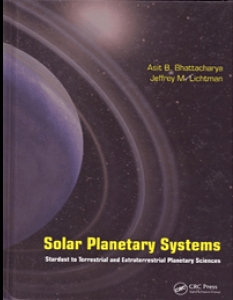The discovery of planetary systems beyond our own familiar solar system has captured the public imagination as well as that of professional astronomers and their students. This book is aimed mainly at the latter category and should provide a useful resource for both students and their teachers. Unfortunately, it comes at a hefty price, and prospective students will need to be convinced of its worth before making the investment.
Subtitled ‘Stardust to Terrestrial and Extraterrestrial Planetary Sciences’, this large volume sets itself an equally large remit and covers multiple aspects of planetary systems in 21 chapters. Following a brief introduction to the main bodies of our solar system, it addresses the origin and formation of the system and then extends this to extra-solar systems. It covers the detection of exoplanets and habitable zones, solar atmospheres, climate change and organic life detection, and even solar satellites, planetary probes and space telescopes.
In fact, one could say that this is more of an encyclopaedia than a textbook. Its numbered sections are, in general, quite brief (perhaps a nod to the attention span of its target readership), but it is logically constructed and most chapters have long reference lists. There is also a 33-page glossary and a 15-page double-column index which enhance its usability. The volume is illustrated with black-and-white photos and diagrams with a smattering of colour here and there.
As a package, it would be hard to find a better, more comprehensive technical introduction to planetary systems… and if a cheaper paperback or e-copy was available as an alternative, the ‘elephant in the room’ of its high cover-price might not apply.











